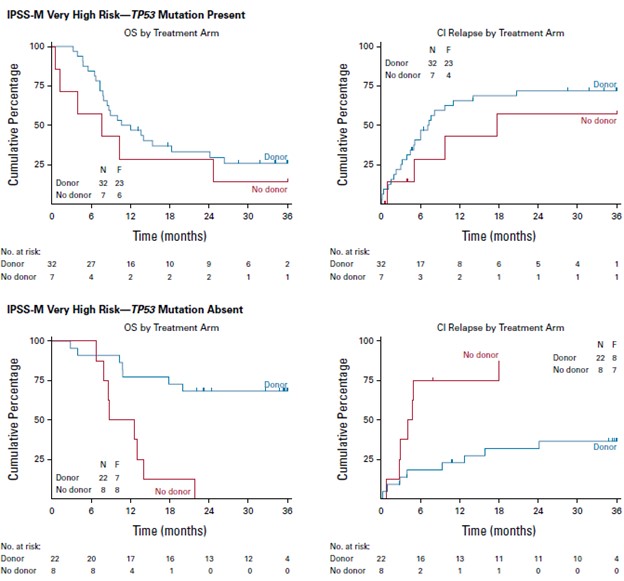This subanalysis of the Blood and Marrow Transplant Clinical Trials Network (BMT CTN) 1102 study explored the influence of genetic mutations, especially TP53 mutations, on hematopoietic cell transplantation (HCT) outcomes for older (50-75 years old) patients with myelodysplastic syndrome (MDS).
Download a PDF of the study highlights and citation.
The findings reveal that allogeneic HCT enhances the survival rates in patients with high-risk MDS across all genetic subtypes, including those with TP53 mutations. These insights emphasize the importance of extending Medicare coverage and prioritizing HCT in the treatment of high-risk MDS.
Background
BMT CTN 1102 was a biologic assignment trial that showed HCT provides a significant overall survival (OS) benefit without any negative impacts on quality of life for older (50-75 years old) patients with available donors who have intermediate to high-risk MDS.
However, criticism was raised that there was no way of telling if the donor and no donor arms of the study were balanced across their genetic disease subtypes. A comprehensive assessment was needed considering genetic mutations known to impact HCT outcomes. With TP53 mutations in particular being associated with suboptimal outcomes, the exact role and benefit of HCT for patients with TP53-mutated MDS has remained ambiguous.
Study Details
Utilizing the BMT CTN 1102 trial of older patients with advanced MDS cohort, 309 of the 384 enrolled patients had pre-biological assignment samples available for genetic analysis. Of these, 229 were from the donor arm, and 80 from the no donor arm.
Results
Gene mutation distribution was fairly uniform between the donor and no donor groups, with TP53, ASXL1 and SRSF2 mutations being predominant. OS in TP53 mutated patients was notably lower than in those without (21% vs. 52% at 3 years). HCT conferred a substantial reduction in death risk, even after adjusting for significant mutations, including TP53.
Crucially, TP53-mutated patients who underwent HCT had improved OS compared to those who didn't, signifying HCT's potential in enhancing survival irrespective of the TP53 mutation.
Key Takeaways
The research affirms the therapeutic promise of allogeneic HCT for all high-risk genetic subgroups of patients with MDS, especially those with TP53 mutations. The genetic study results support the BMT CTN 1102 trial’s original findings and bolster the need to advocate for broadening Medicare coverage to accommodate allogeneic transplants for MDS in older patients, underscoring their life-saving potential.
Figure

Versluis J, et al., Published in the Journal of Clinical Oncology
